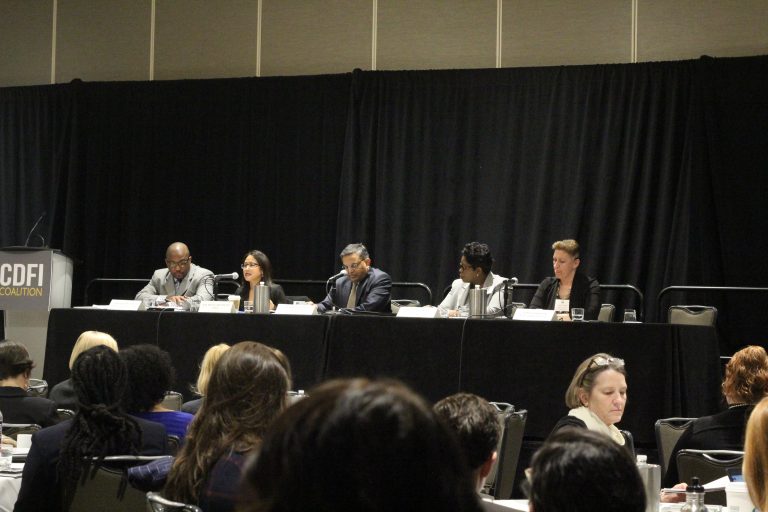2018 CDFI Coalition Institute is a Great Success
Ayrianne Parks | Posted on |

The 2018 CDFI Coalition Institute took place on February 28 and March 1 at the Renaissance Hotel, located at 999 9th Street NW in Washington, D.C. As in the past, the Institute drew a diverse range of CDFIs from across the country to Washington, with some 200 people in attendance at this year’s conference.
The Institute is a two-day event designed to bring real-time information to CDFIs that promotes substantive policy discussions, reflection on industry practices and strategies for the future, as well as offering time to cultivate relationships with fellow community development professionals. Attendees also had the opportunity to engage with key federal agency and congressional staff who participated as panelists and speakers throughout the conference.
Senator Shelley Moore Capito (R-WV) provided an opening keynote at the welcome breakfast on February 28. She is the Chair of the Senate Appropriations Subcommittee on Financial Services and General Government, which has jurisdiction over appropriations for the Treasury Department and the CDFI Fund. CDFI Fund Director Annie Donovan also gave a keynote that morning. A panel of distinguished federal agency staff from the Departments of Agriculture and Health and Human Services, the Federal Housing Finance Agency, and the Small Business Administration also provided insight on tools and resources available to CDFIs. Later at lunch, OFN President Lisa Mensah provided an inspiring keynote, rallying all CDFIs to work closely together to better advocate for the resources necessary to achieve our industry’s mission in serving the economic development needs of those unbanked and underbanked low-income communities and people. After, attendees heard from legislative and policy experts on the new Administration and Congress, including Bob Rapoza, Nick Wyatt of the Senate Committee on Finance (Majority), and Jesse Van Tol, of the National Community Reinvestment Fund.
In the afternoon of the first day, Institute attendees were provided with time to head to Capitol Hill to meet with their respective legislators and share stories and examples of their work locally. That evening, the Coalition hosted a reception on Capitol Hill where Congressman Tom Graves (R-GA) spoke to attendees. He is the Chair of the Appropriations Subcommittee on Financial Services and General Government in the House.
Day two of the conference was kicked off with CDFI Fund open office hours, where agency staff were on-hand to answer questions from CDFIs. The Coalition’s annual business meeting was also held that morning, which included the election of two new Board members, Ted Piccolo of Northwest Native Development Fund (Native CDFI seat) and Scott Berman of Capital Impact Partners (At-Large CDFI seat). John Holdsclaw IV of National Cooperative Bank was also elected to serve a second term on the Board. In addition, the Coalition thanked its current Board Chairman James R. Klein of Finance Fund for his service from March 2016-March 2018, and welcomed incoming Chairman Dominik Mjartan of South Carolina Community Bank.
A highlight of the Institute was a panel sponsored by the W.K. Kellogg Foundation on Fostering Racial Equity in the CDFI Field, which followed the annual business meeting. During this session, panelists discussed the barriers faced by CDFIs dedicated to serving communities of color, and issues accessing local, state and federal resources. They described how CDFIs can ensure the work they are doing fits the community profile they are serving. The audience was asked to reflect upon what actions are needed from within the CDFI field to break down barriers and ensure that our organizations reflect the communities being served and that racial equity is achieved where one’s racial identity is no longer predicted, in a statistical sense, but how one fares. Each of the presenters brought unique perspectives and described challenges their organizations have faced in fostering racial equity, including building and securing assets that are required to access the capital necessary to sustain their families, grow local businesses and create good jobs. During lunch, later that day, Stanley Gimont, Deputy Assistant Secretary for Grant Programs at HUD, and Joyce Klein of the Aspen Institute provided keynotes.
In all, there were 10 great panels and six keynote speakers–providing attendees with a great deal of information and ideas to consider over the next year. Topics spanned from insights from CDFI Fund staff to impact investing, federal resources available to CDFIs, new and existing financial technologies for CDFIs, increasing quality jobs and expanding inclusion in the financial sector, and how private sector financing (particularly major banks) are working with CDFIs, including discussing resources available through their institutions. In addition, attendees had the opportunity to choose between three concurrent sessions, including panels on community development financing through the tax code; expanding access to affordable and inclusive housing for rural areas, in communities of color and for people with disabilities; as well as how CDFIs and their partners are are working to provide innovative solutions for minority-owned small businesses.
The agenda with further details on panelists and speakers is on the Events page of the website, along with links to presentations. You can also view photos from the event on our Facebook page. We hope you will join us next year for the 25th CDFI Institute!
